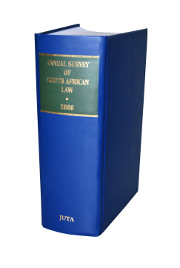Law of Negotiable Instruments

Law of Negotiable Instruments
Authors JT Pretorius
ISBN: 978 1 48513 300 1
Affiliations: Attorney, Professor of Law in the Department of Mercantile Law, College of Law, University of South Africa. Life member of Clare Hall, University of Cambridge, United Kingdom
Source: Annual Survey of South African Law, 2013, p. 870
Abstract
None